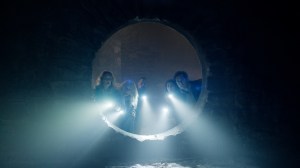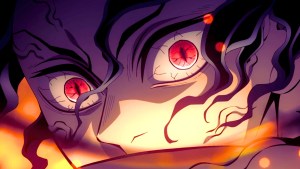Doctor Jekyll is now available through digital On Demand platforms, and the movie — which stars Eddie Izzard in the title role — twists and reinvents the classic novel for the modern age, presenting a Dr. Jekyll who is descended from Henry Jekyll, and obsessed with continuing and perfecting his work. It goes…just about as well as you’d imagine, but the result is a thriller where our point-of-view character (Rob, played by Scott Chambers) is trapped in the house with Dr. Jekyll and trying, slowly, to figure out what is happening around him. Directed by Joe Stephenson, the movie is intended to embrace the camp of the Hammer horror style.
Videos by ComicBook.com
Doctor Jekyll is being hailed as the grand return of the Hammer brand — a name associated with cult, schlock horror movies going all the way back to the 1950s (although the studio itself dates back to 1934). Stephenson joined ComicBook to talk about Doctor Jekyll, the challenges of bringing it to life, and what it was like to make a modern Hammer horror film.

Was this movie written with Eddie in mind?
Joe Stephenson: When we set up this project, the casting of it was really, truly, gender-blind, where we were trying to figure it out.
We were going, “What’s going to make this unique?” and “Is gender ever going to play a part in this story?” We were trying to work it out. And so we talked about a lot of different actors and actresses. It was incredibly wide-reaching.
We were talking to people — and there was some really great people who were interested, but I felt very much like I was making a movie for other people, as opposed to making what I wanted to make, and making something that felt very “me.”
I was trying to make something that would tick boxes, and be like “elevated horror,” trying to do something that ultimately I don’t really relate to. I love those movies, but I didn’t want to make one. I guess then when Eddie’s name came up, it just made sense.
There was just something that clicked that went, it is humor, and it is intelligence, and that surreal stream of consciousness kind of style. Eddie has just made so much sense. I just immediately went, “Oh, now I know.” And the fact that the character becomes trans because Eddie is trans it doesn’t change the plot. The story is still the same. It just so happens that’s Jekyll is trans.
I never wanted to tell a story that was about trans-ness in any way, and neither did Eddie. So, Eddie coming on board was for Eddie’s skills, and for nothing else. It was the right person to do it. Certainly it meant that I could lean into the camp thing, and the old Hammer style, more. I felt like, “Ah, great, I can really go for it now,” which is what I wanted to do.
I felt like I was slightly casting for someone else’s movie, and then I knew when it was Eddie, I was like, “Okay, this all makes sense, in a weird-little-movie kind of way.”
I did hear some people who were worried that Jekyll and Hyde would just be Eddie changing genders, and that it could be really uncomfortable.
Yeah, that was just not a thing, and it was just never going to be a thing. The script was done. The gender was always open ended — it was always Dr. Jekyll in the script — and so I was going, “Anybody can be a doctor.”
To me, it’s more interesting to me to have a character that is trans, and their transness is not a consequence, or causing, anything about the plot of the movie. It’s part of her history, it’s part of who she is, but it’s not part of the events of the movie. And it has no influence on them.
Aside from a plot device that mostly takes cell phones off the table, this is a very contemporary telling of the story. Were there any real-world stories that informed the notion of Jekyll as a tech magnate?
Naturally, the ones that everybody will come to mind, that’s on purpose. We’re going, “Think about those people.” But it really wasn’t modeled on anyone in particular. It was more just this idea of generational wealth, and disparity in wealth, and the power that gives people. It doesn’t matter what industry that is.
That disparity is massive, and the choices that people make, and the idea that she’s taking a drug, and creating drugs, and making money off drugs, whereas Rob has been penalized and has been, has suffered for having experimented with drugs, basically. She got rich over it, and he’s had to go to a juvenile prison and things.
So it’s that disparity really that was the most important. And yeah, sure there’s, we can name people, but I can’t think that ultimately, but I don’t need to, it’s all quite clear.
How important was nailing down Rob’s casting? Because for 75, 80 percent of the movie, just these two people on screen.
So, Scott — his first film was my first film. He was the lead of my first film, and this role was always for him.
What’s interesting about that is, we deliberately talked very much about how there is an expectation of this character. That this character in this movie, everybody will expect him to probably be quite street, quite rough and ready.
The truth of the situation is, a lot of young people who get into drugs. It’s not one type of person, and it’s actually unfair to constantly keep casting that character in that way. We talked about how we would want to do something that’s a little bit more interesting, where actually, we’re dealing with somebody who has himself caught up with the wrong type of people, but he’s actually a very sensitive guy. He’s actually not the type of person you might have expected.
I don’t like tropes. I don’t think it’s like that, especially because it seems to demonize a certain group of people. “Oh, guys like that, lads like that, people who behave that way, who are rough, or where they’re come from tough background to a working class.” He’s had a tough time, but he’s not like that stereotype, and I really liked that. That was something that Scott really wanted to work on, and it’s probably quite unexpected, and that was fun.
Obviously with the casting of Eddie, the bouncing off of each other meant that Eddie’s performance would naturally influence Scott’s performance. He’s got to work out how to balance the screen, basically. And again, the character evolves on screen as we’re filming. Because Scott’s responding to Eddie, and Eddie’s responding to Scott, and that’s the joy of it. That’s why I like slow-burne things that allow actors to act together without having to rush through something. They get to just bounce off each other, and create characters together.
So, it was always Scott’s role. It was just about figuring out what that character was and how that character interacted with Jekyll.
We also have the character of Sandra, and she seems at first like she represents the dark side of wealth and power, but then that gets a little fuzzy.
Lindsay Duncan is this wonderful actress. She’s absolutely wonderful. She’s a legend, and we basically just wanted to really go for it.
Cause it is from Rob’s perspective, and Rob’s perspective is definitely that “she’s mean and she doesn’t like me.” The truth is that actually she cares very much about Nina, and has seen things, and knows things, and is actually trying to protect him as much as her and going, “if you don’t suit this job and this place, this will not end well.”
We had fun. Lindsay has worked with Eddie on stage before. So they already came with a nice little rapport, and felt very comfortable, which is very nice. We talked a lot about their history, and what would have happened in the recent history of Nina, in which she came out of the limelight.
Lindsay just really went for it, and played what I would say is the sort of character you’d expect in a Hammer movie. We wanted to make that character, because it’s Rob’s perspective. There’s a whole other interesting side of her, which if we told the movie from someone else’s perspective, we’d have seen.
How much did the Hammer label inspire your approach? For a while there, I thought, “Oh, this is fairly PG-13 for Hammer,” but then there’s that on scene…
It gets there. [Laughs] It does get there eventually.
It was always meant to be a nostalgic look back, and going back to a type of movie that you don’t really get anymore, which is just that kind of building up to one big finale scenario, which is really what a lot of the original Hammers were.
You can sit and watch Prince of Darkness, but Dracula doesn’t turn up for 45 minutes, and they’re all just wandering around the house going, “Oh, that’s spooky.” It’s all leading up to a big finale. I enjoy that. I like that feeling that something’s building, and I don’t know necessarily what it is, but something’s coming, and that anticipation. I really enjoy and trying to work things out.
So, it was always influenced by those movies, and that time, and also that kind of movie that knows it’s a movie — that slight sort of wink. “Yeah, this is fun. We’re having fun with it.” When it then came to getting Hammer on board, it was just so clear that it was the right thing. Even in how we were talking about the lighting, and how we talk about the design of it, it was all coming from that era. Not just Hammer, but other films from that era as well. It just made total sense, and then suddenly being able to say this actually is a Hammer movie — that’s really lovely, that’s really satisfying. Now it actually does sit in a canon of Jekyll films, in fact. A canon of British horror.








